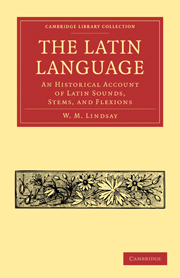Book contents
- Frontmatter
- PREFACE
- Contents
- LIST OF ABBREVIATIONS
- CHAPTER I THE ALPHABET
- CHAPTER II PRONUNCIATION
- CHAPTER III ACCENTUATION
- CHAPTER IV THE LATIN REPRESENTATIVES OF THE INDO-EUROPEAN SOUNDS
- CHAPTER V FORMATION OF NOUN AND ADJECTIVE STEMS
- CHAPTER VI DECLENSION OF NOUNS AND ADJECTIVES. COMPARISON OF ADJECTIVES. NUMERALS
- CHAPTER VII THE PRONOUNS
- CHAPTER VIII THE VERB
- CHAPTER IX ADVERBS AND PREPOSITIONS
- CHAPTER X CONJUNCTIONS AND INTERJECTIONS
- INDEX
- ADDENDA ET CORRIGENDA
CHAPTER VIII - THE VERB
Published online by Cambridge University Press: 05 August 2011
- Frontmatter
- PREFACE
- Contents
- LIST OF ABBREVIATIONS
- CHAPTER I THE ALPHABET
- CHAPTER II PRONUNCIATION
- CHAPTER III ACCENTUATION
- CHAPTER IV THE LATIN REPRESENTATIVES OF THE INDO-EUROPEAN SOUNDS
- CHAPTER V FORMATION OF NOUN AND ADJECTIVE STEMS
- CHAPTER VI DECLENSION OF NOUNS AND ADJECTIVES. COMPARISON OF ADJECTIVES. NUMERALS
- CHAPTER VII THE PRONOUNS
- CHAPTER VIII THE VERB
- CHAPTER IX ADVERBS AND PREPOSITIONS
- CHAPTER X CONJUNCTIONS AND INTERJECTIONS
- INDEX
- ADDENDA ET CORRIGENDA
Summary
§ 1. I. THE CONJUGATIONS. The I.-Eur. Verb had two Conjugations, (1) the Thematic, in which the Person-suffixes were attached to the verb-root augmented by -ĕ- or -ŏ-, e. g. Gk. φέρο-μεν, φέρ-ε-τε; (2) the Athematic, in which this vowel, the Thematic Vowel, as it is called, was absent, e. g. Gk. ἴστӑ-μεν, ἴστӑ-τε. In the Thematic Conjugation the 1 Sg. Pres. Ind. Act had -ō, e. g. φέρ-ω, Lat. leg-ō; the Subjunctive changed the Thematic Vowel of the Indicative to -ē- (and -ō-), e.g. Gk. φέρ-η-τε (φέρ-ω-μεν); the Optative changed it to -oi-, e. g. Gk. φέρ-οι-μεν, φέρ-οι-τε. In the Athematic Conjugation the 1 Sg. Pres. Ind. Act. had -mĭ, e. g. Gk. ἴστη-μι the verb-stem was weakened in the Dual and Plural Act. and in all Numbers of the Middle, e.g. Gk. ἴστӑ-τον, ἴστӑ-μεν, ἴστӑ-μαι, beside Sg. ἱστη-; the Subjunctive (with strong stem) showed -ĕ- or -ŏ- between the root and the Person-suffixes, and the Optative (with weak stem) -yē- in Sg. Act., -ī- elsewhere, e.g. Gk. ἱστӑ-ίη-ν, ἱστӑ-ι-μεν (ἱσταȋ μεν.
We find early Derivative Verbs like I.-Eur. tr-ā- from the root ter-, pl-ē- from the root pel- (Lat. in-trā-re, im-plē-re), and later Derivatives from Nouns, e. g. Lat. curā-re from the Noun-stem curā-, forming the persons of their Present Tense sometimes thematically with the suffix -yŏ- (§ 15), sometimes athematically, e. g. O. Ind. trā-yӑ-tē and trā-ti 3 Sg.
- Type
- Chapter
- Information
- The Latin LanguageAn Historical Account of Latin Sounds, Stems, and Flexions, pp. 453 - 547Publisher: Cambridge University PressPrint publication year: 2010First published in: 1894



